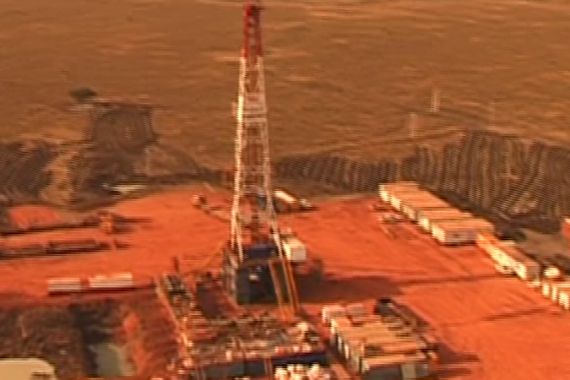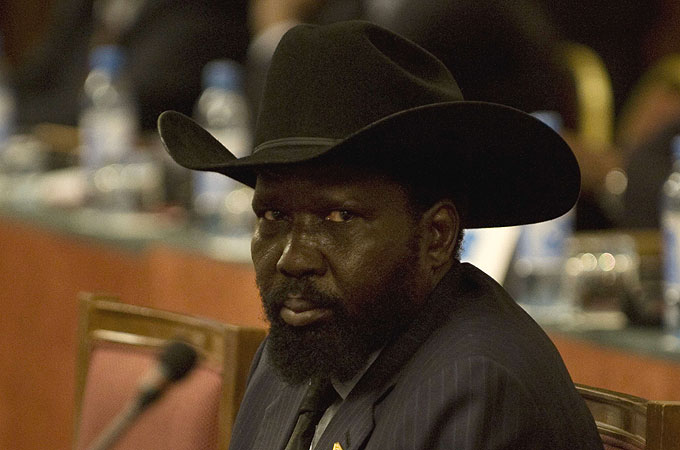Alarm over Sudan oil crisis
Dispute between former enemies seen as major threat to peace in Africa as both sides are seen acting out of desperation.

 |
| Sudan has said its president is ready to sign a deal with Salva Kiir, his South Sudan counterpart [AFP] |
South Sudan has said it will not restart oil production unless Sudan accepts a list of demands amid worries that the issue will spiral out of control.
Ban Ki-moon, the UN chief, said on Sunday that the crisis between the former enemies has become a major threat to peace and security in Africa and Princeton Lyman, the US special envoy to Sudan, said both sides are acting out of desperation, taking “dramatic actions” because they fail to see prospects to reach an agreement.
Stephen Dhieu Dau, South Sudan’s minister of petroleum and mining, said his country was “committed to negotiations” but that Khartoum would have to accept their demand of a $2.4bn financial assistance package before South Sudan turns on production again.
Additionally, Sudan must withdraw troops from the disputed border region of Abyei and stop funding rebel groups in South Sudan under an internationally-guaranteed agreement, he said.
Landlocked South Sudan began halting oil production last week after accusing its northern neighbour of stealing $815m worth of its oil. Sudan detained the oil tankers loading oil from the south in Port Sudan in response.
But Sudanese President Omar al-Bashir decided on Saturday to “release the vessels detained in Port Sudan as soon as possible”, said Sayed al-Khatib, a spokesperson for Sudan’s negotiation team.
Al-Khatib also said Bashir is ready to sign an agreement with South Sudan’s president Salva Kiir “by the end of today”.
He said all parties were ready to sign a deal alongside a meeting of East African leaders in Ethiopia’s capital Addis Ababa. “This would have meant that we could leave the crisis behind us,” he said.
The two leaders had met on Friday in Addis Ababa but the talks were unproductive. Sudan admits to taking oil from the South, but says it was to compensate for export fees and use of its refineries.
Kenyan President Mwai Kibaki, Somali leader Sharif Sheik Ahmed, and Djibouti’s Ismael Omar Guelleh also attended the talks in Addis Ababa.
‘Major threat to peace’
“The situation in Sudan and South Sudan has reached a critical point, it has become a major threat to peace and security across the region,” Ban Ki-moon said at an African Union summit meeting in the Ethiopian capital.
“The international community needs to act, and it needs to act now,” Ban added. “As long as these issues remain unresolved, tensions will only grow.”
Asked by reporters if he feared war could break out again, Ban replied: “That is also a great concern for me as Secretary General. That is why I’m meeting as many African leaders as possible.”
Both sides are acting out of desperation, taking “dramatic actions” because they fail to see prospects to reach an agreement, Princeton Lyman, the US special envoy to Sudan, told the Associated Press news agency.
Unless the two sides reach an agreement, he said, both will “suffer and suffer in not too long a period.”
Lyman said the oil crisis had pushed humanitarian issues off to the side. “It’s clear that the situation is declining very rapidly,” he said.
“Without access for the international community we see what could emerge as a major humanitarian crisis for the continent, and a preventable crisis that the African Union has to address.”
South Sudan split from Sudan in July, taking with it three-quarters of the country’s oil, which makes up more than 90 per cent of the South’s revenue.
Separately, South Sudan said on Friday it had discovered new figures that it claimed showed the north had colluded with oil companies to provide lower production figures on paper than was actually being pumped from the ground.
Stephen Dhieu Dau, the South’s oil minister, said in some cases oil production was under-reported by as much as 15 per cent.
Chinese workers captured
In a seperate development, China said on Sunday that 29 of its workers were abducted from a remote worksite in a volatile region of Sudan.
A Chinese embassy spokesperson In Khartoum said the northern branch of the Sudan People’s Liberation Movement announced the workers’ capture in an attack.
The foreign ministry in Beijing said the fighters attacked on Saturday and Sudanese forces launched a rescue mission on Sunday in coordination with its embassy.
The ministry’s head of consular affairs met with the Sudanese ambassador in Beijing and “urged him to actively conduct rescue missions under the prerequisite of ensuring the safety of the Chinese personnel,” the statement said.
China has close political and economic relations with Sudan, especially in the energy sector.
Sudan has accused South Sudan of arming pro-South Sudan groups in South Kordofan.
The government of South Sudan has called the accusations a smoke screen intended to justify a future invasion of the South.